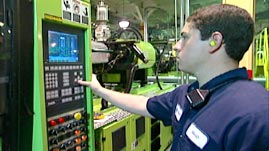Teachers' Domain - Digital Media for the Classroom and Professional Development
User: Preview


Source: Pathways to Technology: "Success Story: Brad Richardson"
In this video adapted from Pathways to Technology, you’ll learn about the role of an electronic maintenance technician, and see how this important position keeps the machines in a factory moving. Community college graduate Brad Richardson always liked taking things apart to see how they work, and his job at Tupperware gives him that satisfaction. Brad describes what brought him to study engineering, and what he does in his career.
Do you try to fix the machines in your life, rather than take them into the shop? Maybe engineering technology is the field for you. It certainly was for electronic maintenance technician Brad Richardson: “I was always interested in the way things work,” he says; “I’ve always been the type of person who tears stuff apart to see how it works and to see if I can get a general understanding of it.”
An electronic engineering technician assists in the production and maintenance of a wide variety of electronic equipment. He or she inspects all the parts of an electronic system for problems, from the tiniest components to the operation as a whole. That means that when a machine stops working, the electronic maintenance technician is often the first person you call to find out why. In his job at Tupperware, Brad designs and troubleshoots the circuits that keep the factory running.
Engineering technology is a broad term for the field that forms the backbone of manufacturing and other industries. It’s often divided into smaller, specialized areas and skill sets. Electrical and mechanical engineering technologies create power systems and their components—things like electrical devices, motors, engines, semiconductors, circuits, and computers.
Career options for engineering technicians are as broad as the field itself. Jobs often require math, science, building, and problem-solving skills in industries like manufacturing, transportation, microelectronics, biotechnology, aerospace, and computer technology. Engineering technicians provide operations, troubleshooting, and other critical information to guide engineering decisions.
Brad got his two-year degree in electronic engineering because he liked figuring out how things worked, and was interested in electricity. The most important skill he brings to his employer is the ability to learn on the job. “A degree in electronics tells me that an individual has the capability to learn, which is essential in a manufacturing environment,” says Tim Mahaffey of Tupperware. “No school teaches how to work on this equipment. When they come here, we have to train them on the specifics of the equipment.”
Electronics maintenance "is a highly technical position,” says Brad. “It involves keeping all the machines in working order. They need to be up to standards to produce quality parts. It’s important to study electronic engineering because it’s one of the fastest-growing job fields in the world today. I got here with the skills and knowledge that I received at my community college."
 Loading Standards
Loading Standards